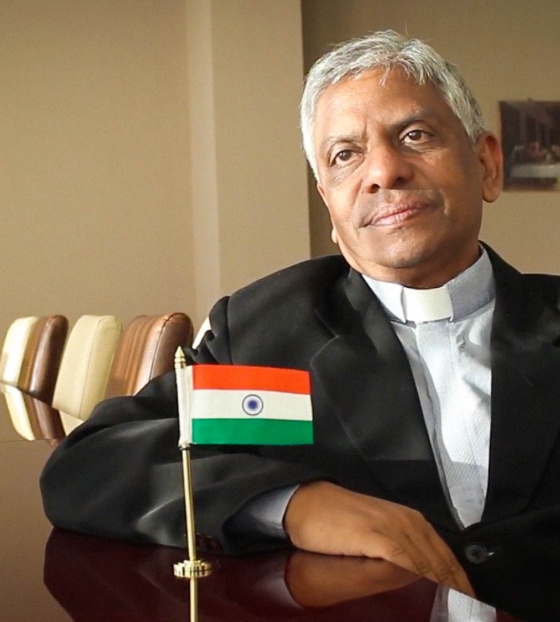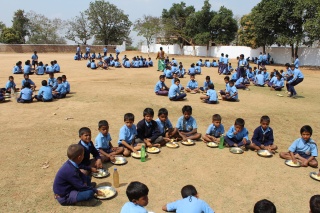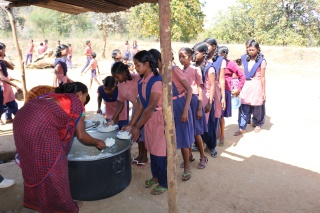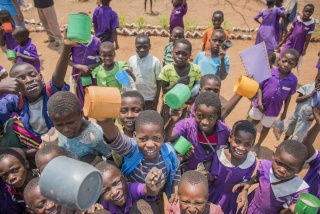

Unifying Communities: Mary’s Meals in India
We recently caught up with two colleagues from our partner organization, BREAD, who are part of the team running our program across India. They reflected on their personal experiences of witnessing hunger, what led them to work with Mary’s Meals and the h
Across five states in India, Mary’s Meals provides more than 71,000 children with a nutritious meal in a place of education every school day. In a country where 13% of children do not complete primary education, the provision of a daily meal in school is making a huge difference to families in poor communities.
Inspired to Serve Children Alongside Mary’s Meals
When Elsie first heard of Mary’s Meals, she worked for an electronics company. Not long after, she and BREAD’s director, Father Joson, visited some of the schools in Jharkhand, eastern India, where our meals are served every weekday, and her experience left a profound impression on her. Today, Elsie is the Program Manager for Mary’s Meals in India.
“I look after the program and I manage the Mary’s Meals data with all the centers,” Elsie explains.
“We have 169 centers and I control the monitoring system data that we get from the centers every day.”
While the immense suffering of the children that Elsie met in Jharkhand is clear to see, the factors causing the high levels of hunger are complex, according to Father Joson.
He told us: “India faces a wide array of challenges. Climate change is felt very specifically in India. We have increasingly erratic rain. In Jharkhand [last year], there has been an absence of the necessary monsoon rain. Because of this, there is a lack of rice production and we are expecting the price of rice to go up. The prices of commodities have gone up because of the war in Ukraine. In a way, we are helpless because there are no irrigation facilities for farmers; they depend entirely on nature, and this year, the rains came too late and too little. We are waiting to see our options. Whatever they are, they will be very limited.
“One of the main challenges the children face is a lack of incentive from their parents to send them to school. Parents do not realize the value of education. Children are often sent to work because getting some sort of income is the priority of the parents. They want the children to work in the fields and because they need to look for a short-term gain, they can be very short-sighted. They feel that sending children to the classroom might be a waste of time and energy. Areas where children live and where we operate are far-flung, inaccessible regions. Some parents are afraid to send their children [to school] if it is very far away, as there are extremists who are involved in armed conflict in Jharkhand. This is a very serious issue, even though it is beginning to diminish.”
Reaching the Most Vulnerable Children
The BREAD team reaches children living in extremely challenging environments such as informal settlements and small, rural villages where food and resources are scarce. Father Joson says it’s the promise of school meals that attracts the children to school where they can learn and that, beyond serving Mary’s Meals, BREAD does what it can to offer educational support to the children where possible.
“We support some children with books, uniforms, shoes and bags, though it's a very small number,” Father Joson explains. “We [also] provide them with skills development and job-oriented training and we monitor them while they go through this [training]. We believe that if a child goes through this tunnel of poverty and comes out the other side, the child can support their family and future generations can be saved.”
Our vision – that every child receives one daily meal in their place of education and that all those who have more than they need, share with those who lack even the most basic things – is what attracts many of our volunteers to join the Mary’s Meals mission. For some who devote their time to our work, the draw is closer to home.

The Valuable Contribution of Volunteers
Joseph, a BREAD volunteer, says, “BREAD’s offices are actually very close to my house! I reached out to Father Joson because I’ve had a strong desire to get into social work for many years. Whenever the staff wants to visit a center where [the Mary’s Meals] school feeding [program] is taking place, I give them a lift in my vehicle. During the pandemic, I saw how hard everyone worked to distribute rations to needy people.
“Volunteering makes me happy in my heart and being able to reach out to, meet with and help people in need has made me so happy. Everybody knows the amount of hunger in the world is too high, but we still live a life of our own. When I go and visit the children, we change our mind for definite, and feel the urge to give something to them financially or spend our time with them, whatever it is.”
The impact of Joseph volunteering his time with Mary’s Meals is plain to see. In the eyes of Father Joson, the effect Mary’s Meals has on the schoolchildren who receive our meals is just as clear, as the mark it is leaving on the country’s caste system.
He says: “Children are healthier and it is a very, very visible impact. [In the centers where our meals are served] the rate of malnutrition has diminished: children are healthier, there's greater attendance at schools and greater enrollment because there is a genuine attraction for parents. Even parents who initially refused to send their children [to learn] are now happy. Early in the morning, there is hardly anything to cook. Instead of finding food, parents fetch wood or forage for natural produce from the forest. When children come to school, their parents feel relieved that at least one meal is taken care of.
Breaking Down Barriers Over a Meal
“India has been a caste-based society for centuries. [A caste-based society is one with a social hierarchy passed down through families that dictates people’s status and the professions they can work in as well as aspects of their social lives, such as who they can marry or would socialize with.] Mary's Meals brings everyone together, irrespective of caste and creed – they can sit together and eat. Mary's Meals is a big leveler as everyone eats from the same Mary’s Meals kitchen.
However, we feel that it is not only the act of eating together but the mindset that we are all one that is embedded in the children's lives. Nobody wants children to grow up with a caste mentality. A person of low caste is always psychologically, economically and socially oppressed, whereas a person of high caste may learn to grow up to feel entitled, sometimes regardless of their financial background. Mary's Meals brings both together. A child who eats meals with everyone else for five years or six years will automatically forget about these divisions – eating is sharing and participating in the life of a community. We are one.”

Hope for a Brighter Future
Program Manager Elsie also finds a wonderful simplicity in Mary’s Meals model – pairing nutrition and education – and this gives her renewed hope for the future.
She explains, “When I visited the Jharkhand area and when I met the people living there, I felt very bad. That was a big thing. I understood that Mary’s Meals is giving food to hungry children and that it makes the pupils come to school. I realized, with Mary's Meals, we give the children the chance of an education too. My hope for the future is to bring more children into the Mary's Meals family.”
India’s malnutrition rates are staggeringly high. A quarter of the world’s undernourished people live in the country. More than a third (35.5%) of India’s children under five years old suffer from stunting. Encouraging children into the classroom with the promise of a nutritious meal every school day while they learn provides some much-needed respite from the challenges they are facing each day.
Whatever time, money or skills you have, you can show support to Mary’s Meals and help this important work to continue, providing hope for millions of children across the world in the face of crisis, hunger and scarcity.

Just $25.20 feeds a child for an entire school year!